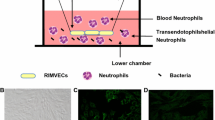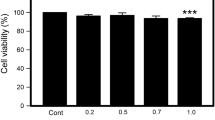Abstract
Objective: Bile acids and ammonia (NH3/NH4 +) are cytotoxic metabolic products, which are known to influence intestinal epithelial functions such as colonic chloride secretion. In this study, we have investigated the effect of bile acids and ammonia on neutrophil-intestinal epithelial adhesive interaction.¶Materials and Methods: Confluently cultured HT29 cells were treated with bile acids or ammonium chloride. Then, 51Cr-labeled neutrophils were added to HT29 cell monolayers, and neutrophil adhesion was assessed by γ-scintillation counting.¶Results: Treatment of HT29 cells with 0.1mM CDCA (chenodeoxycholic acid), DCA (deoxycholic acid), CA (cholic acid) or ammonium chloride but not UDCA (ursodeoxycholic acid) for 30 min increased neutrophil adhesion about 4-folds (p < 0.01). The increased adhesion was inhibited 82-91% by 10 μg/ml anti-CD11b and anti-CD18 mAbs (p < 0.01), but not by anti-CD11a and anti-CD54 (ICAM-1) mAbs. Interestingly, flow cytometric analysis revealed that ICAM-1 expression on HT29 cells was not changed by bile acid- or ammonia-treatment. In addition, the increased adhesion was inhibited about 65% by proteinase K-treatment (10 μg/ml, 1 min, p < 0.05) but not cycloheximide-treatment (1 μg/ml, 30 min) of HT29 cells.¶Conclusions: These observations indicate that exposure of HT29 cells to bile acids or ammonia induces CD11b/CD18 (Mac-1) dependent- but CD11a/CD18 (LFA-1) independent-neutrophil adhesion to intestinal epithelial cells, and ICAM-1 is unlikely involved in the interactions. Furthermore, epithelial ligand(s) for neutrophils are protein molecule(s) which are expressed on the cell surface independent of protein synthesis.
Similar content being viewed by others
Author information
Authors and Affiliations
Additional information
Received 27 October 1998; returned for revision 5 December 1998; accepted by M. Katori 5 February 1999
Rights and permissions
About this article
Cite this article
Miyata, R., Iwabuchi, K., Watanabe, S. et al. Exposure of intestinal epithelial cell HT29 to bile acids and ammonia enhances Mac-1-mediated neutrophil adhesion. Inflamm. res. 48, 265–273 (1999). https://doi.org/10.1007/s000110050458
Published:
Issue Date:
DOI: https://doi.org/10.1007/s000110050458




